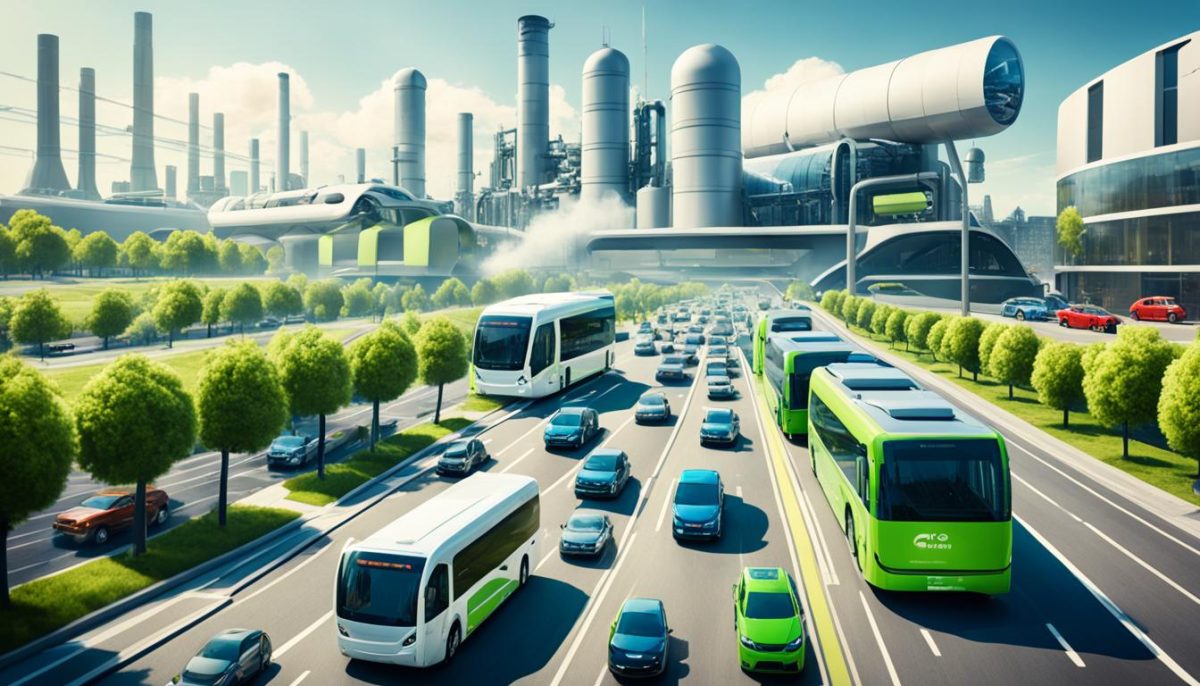In today’s rapidly evolving world, the transportation industry faces the dual challenge of meeting the rising demand for mobility while reducing its environmental footprint. As concerns about climate change and air pollution intensify, the adoption of alternative fuels is gaining traction as a promising solution.
Alternative fuels, such as electric power, hydrogen, and biofuels, offer a cleaner and more sustainable option compared to traditional fossil fuels. They have the potential to revolutionize the way we travel, not only by reducing harmful emissions but also by transforming the entire transportation sector.
But what will be the real impact of alternative fuels on the transportation industry? In this article, we will explore the advantages and challenges associated with their adoption and the potential ripple effects on the industry as a whole.
Before delving into the specifics, it’s important to understand that the term “alternative fuels” encompasses a wide range of options. From electric vehicles that rely on rechargeable batteries to hydrogen-powered vehicles that emit only water vapor, these alternatives offer exciting possibilities for a greener and more sustainable future.
In the next sections, we will delve deeper into the advantages that alternative fuels bring to the transportation industry. We will also address the challenges that hinder their widespread implementation. By examining both sides of the coin, we aim to provide a comprehensive overview of the potential impact of alternative fuels on the transportation industry.
Advantages of Alternative Fuels in the Transportation Industry
Alternative fuels are emerging as a promising solution to address the environmental and economic challenges faced by the transportation industry. By embracing alternative sources of energy, such as electric, hydrogen, and biofuels, the transportation sector can reap several benefits that will have a far-reaching impact on both the environment and the economy.
Reduced Greenhouse Gas Emissions
One of the primary advantages of alternative fuels in the transportation industry is their ability to significantly reduce greenhouse gas emissions. **By shifting** away from traditional fossil fuels like gasoline and diesel, alternative fuels offer a cleaner and more sustainable energy source, thereby helping to combat climate change and improve air quality. In the case of electric vehicles, for example, **they produce** zero tailpipe emissions, leading to a substantial decrease in carbon dioxide and other harmful pollutants.
Enhanced Energy Efficiency
Another notable advantage of alternative fuels **is their** enhanced energy efficiency compared to conventional fuels. **Electric vehicles**, for instance, have **higher energy conversion rates**, converting a greater percentage of energy from the grid to power the vehicle’s motor. This greater efficiency leads to reduced energy wastage, longer vehicle range, and ultimately, a more sustainable and cost-effective mode of transportation.
Decreased Dependence on Fossil Fuels
The transportation industry is heavily reliant on fossil fuels, which come with a host of challenges such as rising costs, geopolitical tensions, and finite availability. By embracing alternative fuels, the transportation sector can diversify its energy sources and decrease its dependence on fossil fuels. This not only enhances energy security but also creates a more resilient and sustainable transportation system for the future.
Economic Benefits and Job Creation
Adopting alternative fuels in the transportation industry can bring about significant economic benefits. Firstly, alternative fuels generally have lower production costs compared to traditional fossil fuels, leading to potential cost savings for both consumers and businesses. Moreover, the transition to alternative fuels has the potential to create new jobs in areas such as research and development, manufacturing, and infrastructure development. These job opportunities can help stimulate economic growth and promote a more sustainable workforce.
| Advantages | Description |
|---|---|
| Reduced Greenhouse Gas Emissions | Alternative fuels like electric, hydrogen, and biofuels contribute to a significant reduction in greenhouse gas emissions, helping mitigate climate change and improve air quality. |
| Enhanced Energy Efficiency | Alternative fuels, particularly electric vehicles, boast higher energy conversion rates, resulting in reduced energy wastage and longer vehicle range. |
| Decreased Dependence on Fossil Fuels | The adoption of alternative fuels allows the transportation industry to diversify its energy sources and lessen its reliance on limited and costly fossil fuels. |
| Economic Benefits and Job Creation | The use of alternative fuels presents cost savings potential and can generate new job opportunities in various sectors, contributing to economic growth. |
By capitalizing on the advantages offered by alternative fuels, the transportation industry has the potential to revolutionize how people and goods are moved, taking significant strides toward a more sustainable, cleaner, and economically viable future.

Challenges of Implementing Alternative Fuels in the Transportation Industry
The widespread implementation of alternative fuels in the transportation industry faces several challenges that need to be addressed. One of the key challenges is the infrastructure requirements. To support alternative fuels, such as electric vehicles, charging stations or hydrogen refueling stations need to be developed and deployed on a larger scale. Currently, the limited availability of these infrastructure elements hinders the adoption of alternative fuels, making it less convenient for consumers and businesses.
Furthermore, the limited availability of alternative fuel options itself presents a challenge. While electric and biofuels have gained traction, other alternatives, such as hydrogen, are still in the early stages of development and implementation. This limits consumer choice and adds complexity to the adoption process.
Technical challenges also pose obstacles to the widespread use of alternative fuels. Electric vehicles, for example, have range limitations that may not meet the demands of long-distance travel or commercial purposes. Additionally, compatibility issues may arise when alternative fuel vehicles need to integrate with existing vehicle fleets, which predominantly run on traditional fossil fuels.
In order to overcome these challenges, stakeholders in the transportation industry need to collaborate to develop robust and interconnected infrastructure systems. Investments in research and development are also crucial to address technical limitations and expand the range of available alternative fuel options. Only by tackling these challenges can the transportation industry embrace the potential of alternative fuels and make significant progress towards a more sustainable future.

